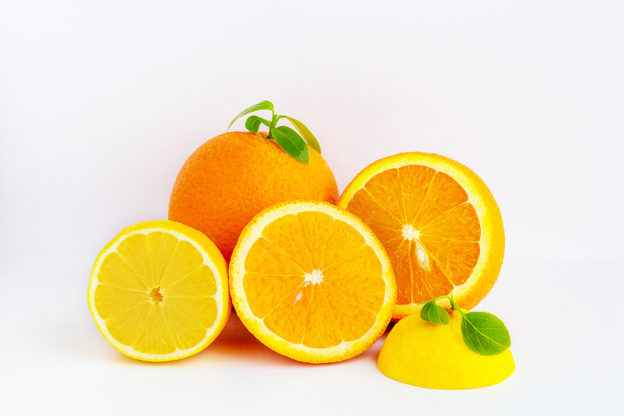By David Blyweiss, M.D., Advanced Natural Wellness
December 30, 2020
Here’s a shocking fact …
It would take eight oranges today to get the same amount of Vitamin A your grandparents got from one. [1]
That should alarm you… it sure alarms me!
The vitamins and minerals we get from our diet play many important roles in the body. It’s clear our foods aren’t as nutritious today as they were in the past. So, we need to do something about it.
I mentioned this concept a few weeks ago. It was in my article talking about the importance of taking the right supplements for your health.
Well, I felt like the issue deserved just a bit more attention…
That’s because our modern farming practices have stripped nutrients from our soils where the food grows. This means that every new generation of crops is truly less good for you than the one before. [2]
This idea of less nutritional value in our foods is well-backed by researchers:
- A study done by the University of Texas found that 43 different vegetables and fruits have less nutrients than those grown 50 years ago. [3]
- The Kushi Institute found calcium levels in 12 fresh vegetables dropped by 27%, vitamin A by 21%, and vitamin C by 30% between 1975 and 1997. [4]
- A study published in the British Food Journal found 20 vegetables with a lower calcium content of 19%, lower iron by 22% and lower potassium by 14%.
Then, researchers are finding 7-29% lower levels of magnesium in conventionally grown wheat crops since the year 1850. This has been linked to a rise in cardiovascular disease by researchers. [5]
Another British study found lowers levels of potassium and zinc in modern wheat crops. They also found higher levels of toxic metals like arsenic and cadmium compared to organically grown wheat. [6]
This Isn’t an Excuse Not to Eat Your Veggies
With all this bad news, it’s easy to think you should just give up. But that’s actually the last thing I would advise.
Eating a wide variety of fruits and vegetables is important to help lower your risk for chronic diseases. This includes things like cancer, cardiovascular disease, stroke, Alzheimer’s, cataract, and age-related decline. [7]
It’s also an important piece of the puzzle when it comes to a health gut microbiome.
The World's Quickest Solution for Ending Prostate and Urinary Misery
This has recently been revealed to be one of the only real breakthroughs in prostate health.
The seeds of a strange fruit (sometimes called "Chinese Apples") hold powerful phytonutrients that are a revolution in prostate health.
In fact, UCLA and Veterans Administration research have now proved this to be true.
Not only that, but it may be the worlds quickest solution for ending prostate misery.
Simply stated, these phytonutrients represent a huge step beyond beta sitosterol, saw palmetto, and other phytosterols alone.
Simply click HERE if you want to have fast prostate relief...restful, uninterrupted sleep...no more constant "urges to go"...enhanced virility...and optimal prostate support for life.
I suggest eating fruits and vegetables from all the colors of the rainbow. This helps provide your body with the nutrients and phytochemicals it needs to feed those healthy bacteria in your gut.
The more you eat, the more of the right bacteria will thrive in your system. The more they thrive, the healthier you will be.
Your best bet to combat this problem of lower nutrient produce is to:
1) Opt for organically grown fruits and vegetables. This will help you avoid GMO crops and harmful chemicals like pesticides, herbicides, and fungicides. These chemicals are routinely used on commercial crops.
2) Buy from local farmers markets whenever possible. After all, the food grown down the road is likely better for you than the food shipped in from an average of 1500 miles away or worse, another country.
3) Supplement your nutritional needs with the things you’re missing from your foods: vitamin C, fish oil, b-vitamins, vitamin A, CoQ10, and calcium.
Human health begins with food health, and that starts at the level of the soil it’s grown in. So support sustainable farming practices in your community whenever possible.
Sources:
[1] Scientific American. “Dirt Poor: Have Fruits and Vegetables Become Less Nutritious?” April 27, 2011. Available Online: https://www.scientificamerican.com/article/soil-depletion-and-nutrition-loss/
[2] Scientific American. “Dirt Poor: Have Fruits and Vegetables Become Less Nutritious?” April 27, 2011. Available Online: https://www.scientificamerican.com/article/soil-depletion-and-nutrition-loss/
[3] Davis, Donald R., Melvin D. Epp, and Hugh D. Riordan. “Changes in USDA food composition data for 43 garden crops, 1950 to 1999.” Journal of the american College of nutrition 23.6 (2004): 669-682.
[4] Jack, Alex. “Nutrition under siege.” One Peaceful World (Kushi Institute newsletter), Becket, MA 1 (1998): 7-8.
[5] Rosanoff, Andrea. “Changing crop magnesium concentrations: impact on human health.” Plant and Soil 368.1-2 (2013): 139-153
[6] Vrček, Ivana Vinković, et al. “A comparison of the nutritional value and food safety of organically and conventionally produced wheat flours.” Food chemistry 143 (2014): 522-529.
[7] Goicoechea, Nieves, and M. Carmen Antolín. “Increased nutritional value in food crops.” Microbial Biotechnology 10.5 (2017): 1004-1007.







